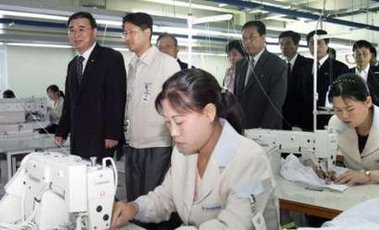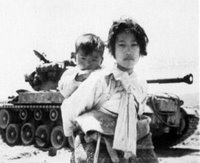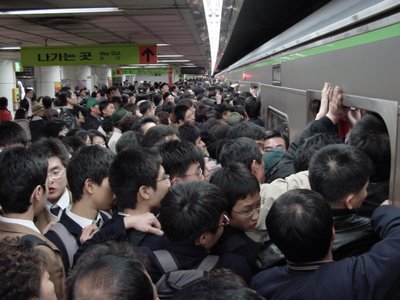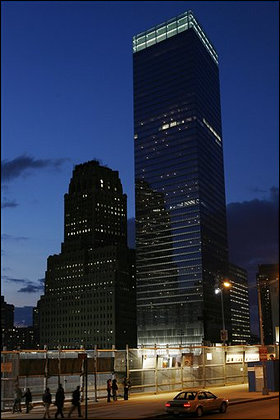The June editions of
Time Magazine also included
a detailed description of the nature of the student movement in Korea, from the time of Japanese colonization to the (then) present day.
With the over-reaction to certain events today and the way in which left-leaning (and perhaps directly North Korea-supported) student groups and the Korea Teachers Union tried to manipulate and distort issues for their nefarious ends, the student movement really started to run out of things to protest by the mid-1990s (see
June Cho's description of demonstrating for the sake of demonstrating). Even today, few of the protests surround issues that come even close to the weight of things in 1919, 1960, 1980, or 1987. I gave a description of my own thoughts on the demonstrations
in this comment, and I probably should hammer that into a post on its own.
Monday, Jun. 02, 1980
Legacy of Righteous Tumult
In the Republic of Korea the events of April 1960 are popularly known as hak saeng uigo—the Righteous Student Uprising. During those turbulent days, the students of South Korea succeeded in doing what their country's politicians had failed to do: they brought down the entrenched, increasingly corrupt twelve-year-old government of President Syngman Rhee and sent the crusty old leader into exile. Today, even the official Handbook of Korea, published under the Park Chung Hee regime hails the uprising unreservedly. "The students," it declares, "had led the people into a democratic revolution."
Rhee became the victim of a Korean institution that his own fervent nationalism had helped to sanctify: student resistance to unjust authority. It was a modern notion, born after the Japanese annexation of Korea in 1910. In the wake of the first World War, Korea was swept with rumors that peace would bring independence. On March 1, 1919, a group of nationalists issued a manfesto urging Koreans to rise up in self-determination. Students, one of the few groups to escape the watchful eye of the Japanese, had carried the demonstration plans across the country. As many as 2 million took to the streets. The terrified Japanese killed thousands, imprisoning thousands more for insurrection. The uprising failed, but the students had tested their power.
Ten years later a spontaneous uprising flared in Kwangju—the site of last week's strife. It began when Japanese soldiers mistreated some Korean girls, and soon spread among students across the city, most of them middle-school teenagers. The Kwangju demonstrations inspired sympathetic protests throughout the country. The disorders lasted four months, and eventually involved 54,000 students.
The 1960 rebellion against Rhee made the students heroes against a home-grown Korean government. No sooner were they wearing their laurels than they began to flaunt them. During the short-lived second republic under Prime Minister Chang Myon, 1960-61, the young people took the offensive once again. They marched on the National Assembly, invaded it and demanded harsh punishment for miscreants of the Rhee regime.
Some of them also seemed dangerously swayed by fraternal feelers from North Korea; they proposed, among other things, a bilateral conference of students of the two countries. The army, which had stood neutrally by as Rhee was toppled, suspected subversion. On May 16, 1961, a group of officers staged a bloodless, predawn coup against the hapless Chang government. Among the junta's leaders, soon to emerge at the top: Park Chung Hee.
Though he had indirectly been installed by student power. Park remained wary of its potential. On two occasions after his coup, Park reimposed martial law to quell demonstrations. Finally, in one of his emergency decrees in 1974, Park outlawed protest under pain of penalties ranging from one year's imprisonment to death. Ultimately, one of the disagreements that was to lead to Park's assassination was how much latitude the government should give to frustrated young dissidents.
Apparently, authorities in Seoul still do not know the answer to that question. On the one hand, students have long been expected to be in the forefront of the country's nationalistic struggle and revolutionary Western change. That is one reason they tend to be earnestly pro-American and devoted to U.S. political ideals. On the other hand, that quest for freedom, as the spreading protests of the past two weeks have demonstrated, can pose a threat to the country's stability. In the conflict being re-enacted today, says former U.S. Ambassador to Seoul Richard Sneider, "both the military and the students have been overreacting. The tragedy is that what the military has done potentially has increased the danger of instability."
 A baby named Jie-Jie was born at a small local hospital in China's Anhui Province, armed with, well...three arms. All of them functional to some degree.
A baby named Jie-Jie was born at a small local hospital in China's Anhui Province, armed with, well...three arms. All of them functional to some degree.




































